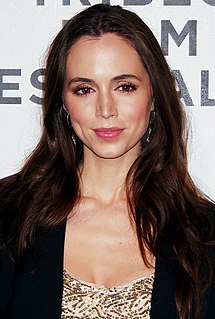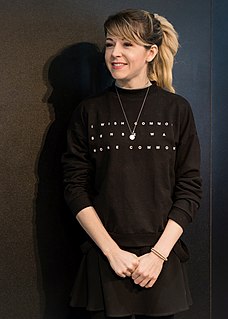A Quote by Jenna Wortham
There is no picturesque version of what self-care looks like; it's different for every person who wants to practice it.
Related Quotes
That's such a big part of film scoring that people don't realize. There's a portion of film scoring that's writing the music, but a lot of it is how do you get along with the guy you're working with, how do you interpret what he wants? It's so subjective, you know? Your version of sad is probably different than my version of sad. It's my job to figure out what your vision of sad looks like.
One of the tools I like a lot is the Just Like Me practice. It's one of the empathy practices where we put ourselves in the other's shoes. Rather than get caught up in the difference in the ideologies, we actually come back to the fundamental idea: just like me, this person on the opposite political spectrum wants to be happy, wants to be safe, wants to thrive, wants to be healthy, wants to find peace of mind.
You travel the world, you go see different things. I like to see Shakespeare plays, so I'll go - I mean, even if it's in a different language. I don't care, I just like Shakespeare, you know. I've seen Othello and Hamlet and Merchant of Venice over the years, and some versions are better than others. Way better. It's like hearing a bad version of a song. But then somewhere else, somebody has a great version.
I wake up and play a different person every day. Playing all these different characters and trying to figure out who your true authentic self is at the core of that as you're playing all these different roles, and man, that self-awareness starts to come into effect. And you start to see who you really are.
It looks as if there were a single ultimate goal for mankind, a far goal toward which all persons strive. This is called variously by different authors self-actualization, self-realization, integration, psychological health, individuation, autonomy, creativity, productivity, but they all agree that this amounts to realizing the potentialities of the person, that is to say, becoming fully human, everything that person can be.
I think that if you are sticking to the text, essentially, you're not trying to write your own version of it. I mean, of course, it is your own version of it. And every translator would probably have a different version. But I think that that's what keeps the writers from being individual in English. They may be my English, but I don't think that Ferrante sounds like Levi.
A practice that is suitable for one person is not necessarily suitable for someone else, and a practice that is appropriate for one person at one time is not necessarily appropriate for that same person at another time. Buddha did not expect us to put all his teachings into practice right away--they are intended for a great variety of practitioners of different levels and dispositions.
There are all these levels of pretension in LA. Every time you walk into a café or a bar or a restaurant in LA everybody turns around to see if you're famous. Everybody can seem like a celebrity. You can meet somebody who looks like Joe Schmoe and he turns out to be the head of HBO or something. Or you meet a person who just won an Oscar and he looks like he just won an Oscar. And it's a sprawling city, there's so many different parts to it.
I like to think of my customer and make sure that season after season she is getting what she wants. Ultimately, I suppose I have an image of myself. That is the person I am designing for - a woman who loves and appreciates fashion and luxury, and somebody who wants to feel empowered with the best version of themselves.
I think that deprecation part is a very important aspect because when someone looks into themselves, if they're going to be honest, they're going to see parts that are humiliating as well as parts that they might feel really great about. Take Lucas Samaras again, who made a lot of self-portraits. He makes one self-portrait where he is looking directly into the camera and looks so intense and cool. He says in an interview, "I wanted to present the best version of myself."

































